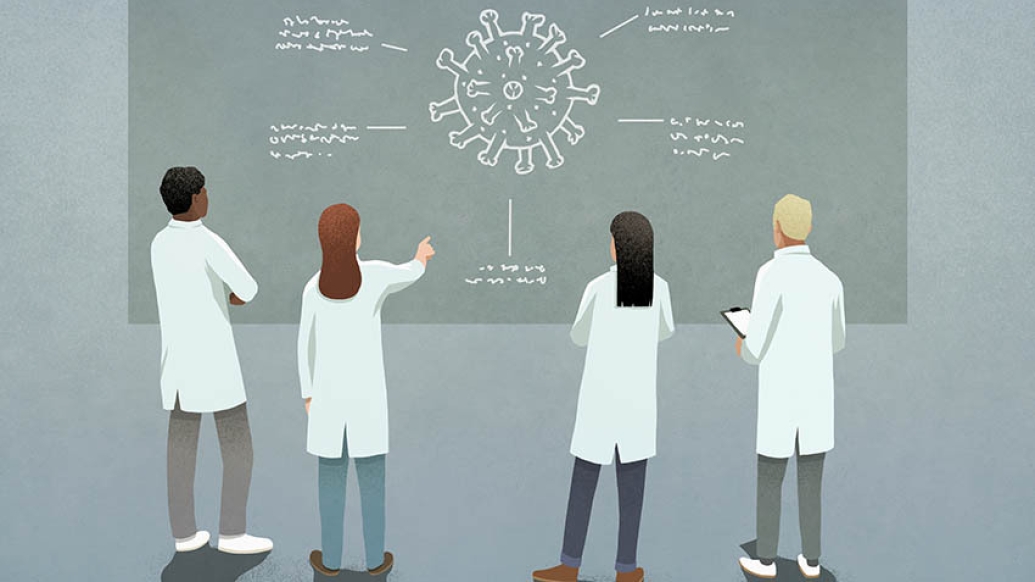Preliminary observations of COVID-19 patients with diabetes inspired an algorithm for glucose monitoring that’s suspected to help combat the virus’ serious complications.
12:43 PM
Author |

As COVID-19 continues to rage across the U.S., researchers are digging deeper into how the virus wreaks havoc on the body, especially for those with a pre-existing chronic illness.
Now, after preliminary observations of 200 COVID-19 patients with severe hyperglycemia, a Michigan Medicine team is shedding light in a new Diabetes paper about why high blood sugar may trigger worse outcomes in people infected with the virus. And researchers have developed a blood sugar management tool that may potentially reduce risk of secondary infections, kidney issues and intensive care stays in people with diabetes, prediabetes or obesity who get COVID-19.
"Based on preliminary observations of our patients, those with one of these pre-existing conditions are at high risk for making the virus-induced respiratory dysfunction much worse, potentially resulting in death," says first author Roma Gianchandani, M.D., a professor of internal medicine in the Michigan Medicine division of metabolism, endocrinology and diabetes.
But why?
Senior author Rodica Pop-Busui M.D., Ph.D., the Larry D. Soderquist professor of diabetes, professor of internal medicine and vice chair of clinical research in the Department of Internal Medicine, suspects it's the low grade, inflammatory nature of diabetes and hyperglycemia that promote the virus' inflammatory surge, resulting in insulin resistance and severe hyperglycemia.
"When the body becomes this inflamed, it triggers an abnormal immune response that instead of just attacking the virus, affects the rest of the body's healthy cells and tissue, leading to rapid deterioration in health," she says.
Specifically, these patients are at an increased risk for mechanical ventilation, kidney replacement therapy due to kidney failure and requiring medications known as vasopressors to stop dangerously low blood pressure or steroids to combat acute respiratory distress syndrome.
"All of these complications make blood sugar management more difficult, but our team is convinced this management is essential to prevent complications that lead to prolonged inpatient stays, or morbidity," Gianchandani says. "A recent study has already shown there's a correlation between well-controlled blood sugar and lower levels of inflammatory markers."
The research team developed a tool to identify and manage high blood sugar in COVID-19 patients, placing them into certain risk categories that looked at hyperglycemia severity, presence of obesity, level of insulin resistance, extent of kidney dysfunction and evidence of rapid changes in inflammatory markers.
Implementing an algorithm
The newly created hyperglycemia management teams set out to find a way to monitor patients' diabetes without having to use more personal protective equipment to visit the rooms all the time. It was also important to reduce the health care provider's exposure to the virus as much as possible.
Although typically accurate, a continuous glucose monitor wouldn't be as helpful because a patient's low blood pressure and the use of blood pressure medications could falsely elevate blood sugar levels.
The new protocol called for insulin delivery every six hours, and at the same time a nurse would check in on the patient. Some patients who were on ventilators or receiving high doses of Vitamin C would get their arterial or venous blood sugar levels checked, replacing the need for the team's blood sugar check.
For those with the highest blood sugar levels and severe hyperglycemia, insulin infusions were an option for patients until their levels fell between a normal range.
The result of these efforts helped successfully lower blood sugar levels without increasing nurse contact or the overall burden on primary care teams and PPE usage.
"Improving blood sugar control was important in reducing the amount of secondary infections and kidney issues this cohort of patients are susceptible to," Gianchandani says. "This might help shorten ICU stays and lessen the amount of patients that need a ventilator."
It's important to note this algorithm wasn't developed as a result of a clinical trial, but is based solely on preliminary observations in the patients the team followed. A larger, randomized and controlled study is necessary to determine how this algorithm impacts mortality, time to recovery, the length of ICU stays and rate of severe complications.
"Our team is looking forward to the next steps in confirming our hypothesis," Gianchandani says. "In the meantime, I think these observations validate the importance of blood sugar management in COVID-19 patients and can serve as a guide or inspiration for other institutions."
Other members of the hyperglycemia management teams include Nazanene H. Esfandiari, M.D., Palak Choksi, M.D., Lynn Ang, M.D., Jennifer Iyengar, M.D. and Sharon Knotts, NP.
Paper cited: "Managing Hyperglycemia in the COVID-19 Inflammatory Storm," Diabetes. DOI: 10.2337/dbi20-0022

Explore a variety of healthcare news & stories by visiting the Health Lab home page for more articles.

Department of Communication at Michigan Medicine
Want top health & research news weekly? Sign up for Health Lab’s newsletters today!





